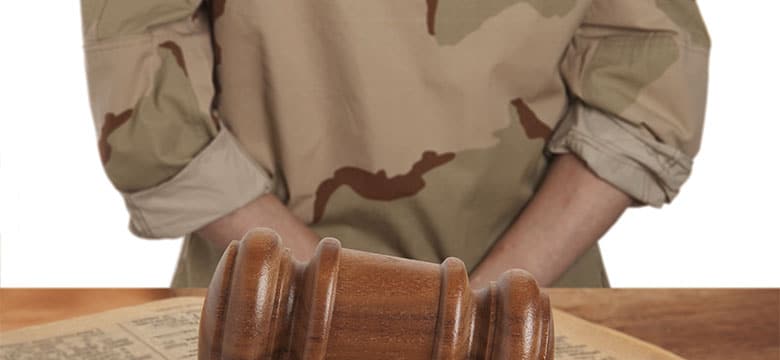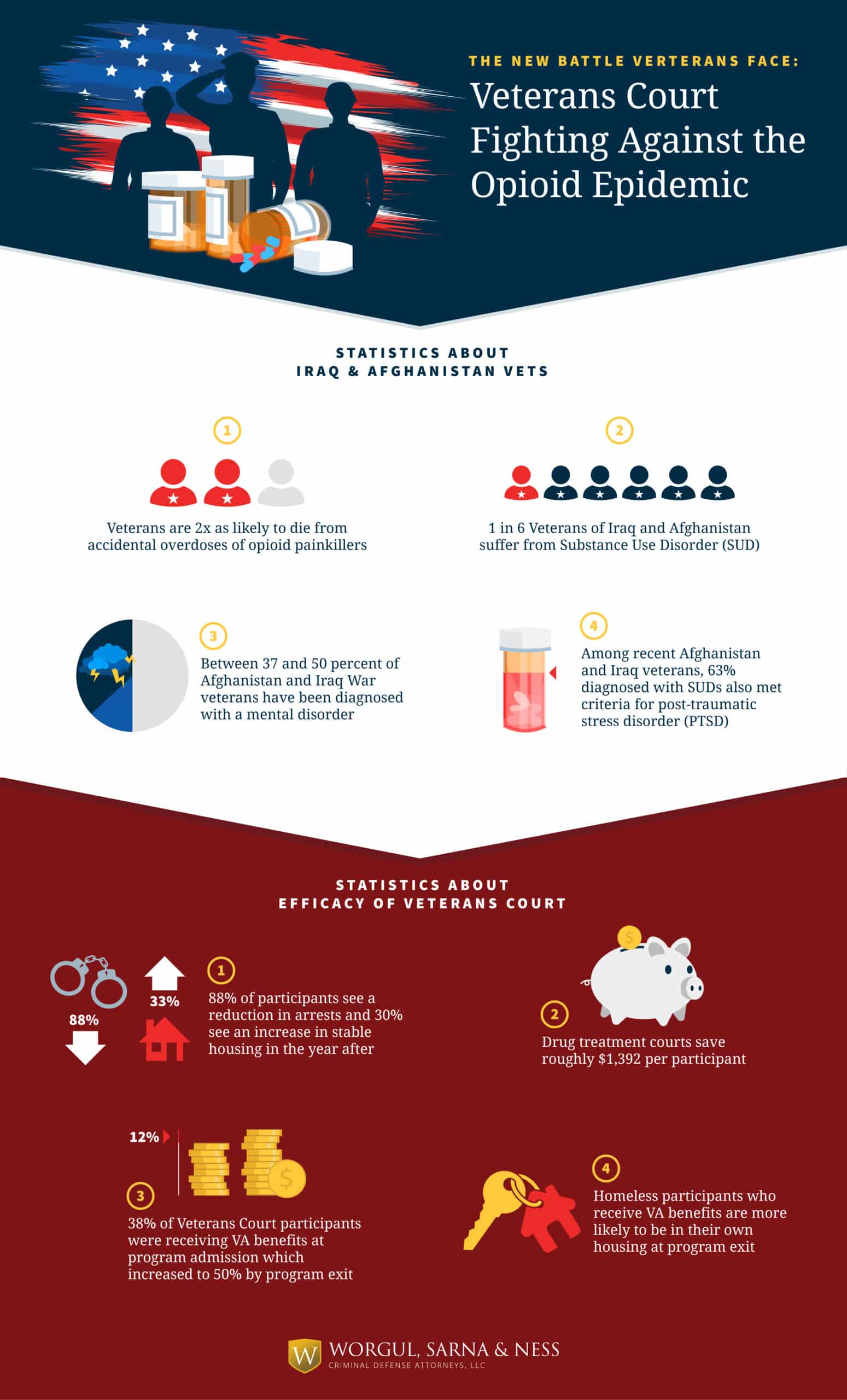What Is Veterans Court in Pennsylvania?

Pennsylvania’s Veterans Treatment Court (usually called Veterans Court) is an alternative to incarceration for veterans facing criminal charges. Based on similar effective programs (such as Drug Courts), this specialized program helps veterans connect with resources for addiction, mental illness, or other disorders. Veterans Court addresses the underlying issues that often lead to criminal behavior.
Many veterans find it challenging to adjust to civilian life. Like many other states, Pennsylvania provides Veterans Court as an alternative to imprisonment and other traditional criminal justice actions.

We Owe America’s Veterans
The United States currently has about 1.3 million active-duty service members from a population of over 258.3 million Americans ages 18 and older. Military service requires enormous sacrifice from members and their families. Long deployments wreak havoc with personal relationships. The pay is often lower for service members than their civilian counterparts, when applicable. And always, there is the possibility of severe injuries or death.
When America’s veterans sacrifice so much for us, we owe it to them to provide the resources they need when they find themselves in legal trouble.
Veterans Face Unique Challenges
Of the 2.6 million Iraq and Afghanistan veterans, 50 percent suffer from one or more treatable conditions, including:
- One in six veterans has a substance abuse disorder.
- One in five show signs of cognitive impairment or a mental health disorder.
- Veterans are twice as likely to die from accidental overdoses of opioid painkillers.
- Half of returning veterans have untreated PTSD.
Approximately 38,000 of all veterans nationwide are homeless. Additionally, most employers are not obligated to hold jobs open for returning veterans. Without proper resources, housing stability, and lack of physical and emotional illness treatment, veterans are trapped in the criminal justice system.
Mental Illness and Injuries Can Be Tied to Incarceration
According to Justice for Vets, 81% of justice-involved veterans had a substance use disorder before incarceration. About 25% of justice-involved veterans suffered from mental health issues. Some of America’s 181,000 incarcerated veterans might have avoided prison had they received proper treatment, counseling, and support. Veterans Court is an effective diversion program designed to reduce the number of justice-involved veterans. More than 20 percent of veterans with PTSD also have a substance abuse problem.
Additionally, many veterans who suffer severe and catastrophic injuries receive prescriptions for pain relief. This factor may account for veterans being two times more likely to overdose from opioid painkillers than non-veterans. Justice-involved veterans account for 14 percent of drug crimes nationwide, according to the U.S. Justice Department. Veterans Courts offer a path to counseling, support, and drug treatment programs, both inpatient and outpatient. Some Drug Courts throughout the state also have a veteran’s track.
Why is There a Special Court for Veterans?
The United States of America wouldn’t be what it is without its military. This subset of our population represents some of our country’s best and bravest, and we are forever indebted to their service. Interestingly, the state of Pennsylvania is home to nearly 800,000 veterans, making it the state with the fourth-highest veteran population.
Veterans have unique training and life experiences that are often misunderstood or ignored by traditional criminal justice courts. According to the National Institute on Drug Abuse, veterans are more likely to suffer from mental illnesses like PTSD or depression than non-veterans. This often leads to substance abuse and addiction — and eventually, criminal charges.
Pennsylvania has the fourth-largest population of veterans in the country, with an estimated 798,000 veteran residents. Both prosecutors and judges realize the need for an effective alternative to the criminal justice system for veterans. This is why Pennsylvania has a special veterans court system that caters to the specific, and often sensitive, nature of veterans’ criminal cases.
How Do I Know If I’m Eligible for Veterans Court?
The biggest benefits of Veterans Treatment Court is that they offer suffering veterans treatment, accountability, and structure in place of incarceration. Not only does this help ground veterans and reintegrate them into a civilian society, but it directly addresses the unique mental health and substance abuse issues veterans typically face.
What’s more, veterans will go through this process together, and this community of peers will help hold them accountable to their treatment program and its requirements. They’ll also receive customized treatment and meet regularly with a veteran mentor, who can help them make sense of all the emotions that arise throughout the program.
With an average success rate of 98%, these Veterans Treatment Courts have helped thousands of veterans get their lives back on track and stay out of the criminal justice system.
Generally speaking, you must be a veteran with mental health or substance abuse issues who is facing a criminal charge to be eligible for these programs. It doesn’t matter whether you were honorably or dishonorably discharged, either; you’ll still be eligible. However, your criminal charges must be nonviolent to qualify. Specifically, your charges will be put on hold until you finish treatment, where they can then be reduced or outright dismissed at the district level.
Here’s a list of some common nonviolent offenses that will still leave a veteran eligible for the Veterans Treatment Court Program:
- DUI/DWI
- Drug possession
- Drug use
Once you’re deemed eligible to participate, you’ll have to satisfy the requirements for each step in order to successfully complete the program.
How Does Veterans Court Work in Pennsylvania?
Defendants in Veterans Court must commit to a rigorous program as an alternative to jail or prison. The emphasis is not on punishment, but a focused interdisciplinary program designed to discourage repeat offenders. The court works with the Veterans Administration and other agencies to give participants the help and support they need to achieve:
- Affordable, stable housing
- Reliable transportation via a free public transit service for veterans
- Sobriety
- Improved mental health
- Financial independence through a veterans’ jobs initiative
A Breakdown of the Treatment Program
Veterans Treatment Courts are similar to DUI diversion programs in that they ultimately seek to address defendants’ underlying substance abuse issues. Here are the five phases to the program.
- Phase One – In the initial phase of the program, you’ll be assigned a probation officer who you’ll meet with weekly, and you’ll have to attend at least three Narcotics Anonymous or Alcoholics Anonymous meetings. On top of this, you may be subject to random drug or alcohol tests in addition to receiving an electronic home monitoring system to ensure that you’re staying away from places you shouldn’t be going. You’ll also have to show up for monthly progress reports and start paying back your fines and court fees.
- Phase Two – If you make it to Phase Two without any hiccups, then you may receive special privileges to go to social outings that are not employment, school, or treatment-related. You will still have to continue meeting with your probation officer, attending substance abuse program meetings, and participating in random drug and alcohol screenings, though. Failure to comply with these rules may incur additional penalties, so do your best to stay out of trouble.
- Phase Three – This is when your electronic home monitoring becomes a little less restrictive, provided you’re still meeting all the program requirements. At this point, your drug screening and meetings with your probation officers will become bi-weekly instead of weekly.
- Phase Four – The biweekly drug screenings and meetings with your probation officer still apply during this phase. You’ll also have to adhere to a curfew from 11 p.m. to 7 a.m., unless your probation officer grants you special permission to be out of your house during these hours.
- Phase Five – Naturally, this is the phase where you’ll enjoy the most freedom. Here, your curfew will be removed and you’ll only have to attend one substance abuse program meeting per week, as opposed to the two meetings in the earlier phases. You’ll still be subject to random drug and alcohol screenings and will have to continue paying your fines and court fees, but you’ll only have to meet with your probation officer once a month.
To successfully graduate, you’ll have to successfully complete all the phases and recommended treatment, as well as maintain employment, live a lifestyle that promotes sobriety, and stay sober or drug-free for at least 12 months. If you can accomplish all of that, then congratulations–you’ve made it through.
Specially Trained Probation Officers & Mentors
Program participants have specialized probation officers who are familiar with the needs of former service members. Additionally, defendants have support and guidance from mentors, informally called “battle buddies.” These mentors share their experience, strength, and hope with participants to guide them through the successful completion of Veterans Court.
Pennsylvania’s Veterans Court Locations
Pennsylvania’s first Veterans Court opened in Lackawanna County in November 2009. Since then, Veterans Court has been available in multiple counties. More information and a map of Veterans Court locations in Pennsylvania can be found here.
What is the Success Rate of Veterans Court?
According to the Unified Judicial System of Pennsylvania, 207 of the 233 participants in the 2018 Veterans Court program completed the program. This high completion rate means that 81 percent of participating veterans successfully graduated, allowing them to re-enter civilian life stable and substance-free.
In an early study of veterans’ courts, researchers found that 89.5 percent of program participants:
- Remained arrest-free during the program
- Experienced substantial improvement with depression and PTSD
- Achieved and maintained a substance-free life
- Enjoyed better emotional health
- Found stable housing
- Formed better personal relationships and social connections
- Reported improved overall functioning and well-being
PA Veterans Court Contact Information
- Get a downloadable form with contact information to Pennsylvania’s Veteran Courts.
- Connect with the Department of Military and Veterans Affairs in Pennsylvania
- Visit the Veterans Crisis Line website or call the Veterans Crisis Line at 1-800-273-8255.
How Worgul, Sarna & Ness Can Assist You
Here at Worgul, Sarna & Ness, Criminal Defense Attorneys, LLC, we understand how challenging it can be for veterans as they try to reintegrate into civilian life. Unfortunately, many of the unique psychological issues they face often land them in a vicious cycle of substance abuse and incarceration.
Our team of seasoned, knowledgeable criminal defense attorneys can help guide you through your case while also getting you the help you need in the Allegheny Veterans Treatment Court program. Call us today at (412) 281-2146 to learn more about how we can best serve you.